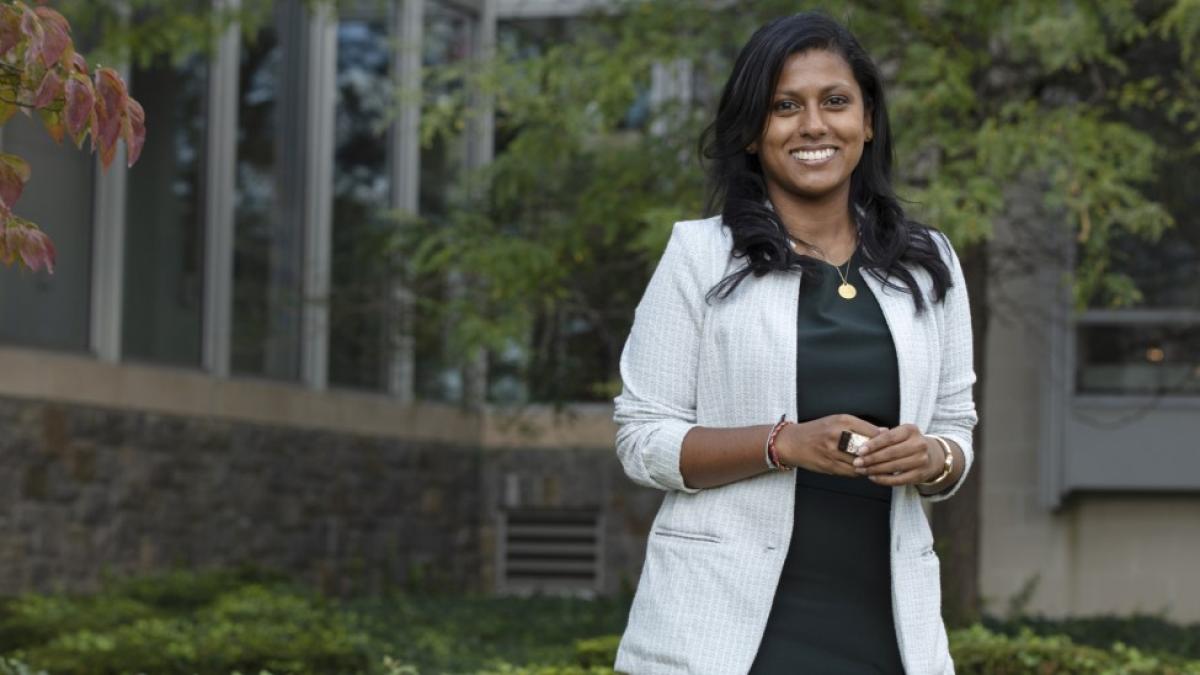The Elisabeth Haub School of Law at Pace University is proud to announce that the 2025 Ottinger Award for Faculty Achievement has been awarded to Achinthi Vithanage, Professor of Law for Designated Service in Environmental Law & Executive Director of Environmental Law Programs. The Richard Ottinger Faculty Achievement Award is awarded annually by the Faculty Development Committee, in consultation with the Dean, in recognition of a full-time professor’s outstanding service to the law school, the legal profession, or both. The award generally is based on the faculty member’s outstanding service during the previous academic year.
Feeding Westchester Food for Thought

Once a month, a mobile food pantry rolls onto Pace’s Westchester Campus and staff and students from across the community—with special support from the Center of Community Action and Research; Student Engagement; and the Division of Opportunity and Institutional Excellence—gather. There, volunteers distribute food to any member of the Pace Community who needs the support, no questions asked. It feels less like a food pantry and more like a farmer’s market. Why? Because the volunteers know that there is no shame in food insecurity.
“This isn’t a Pace problem. It’s not even a student issue. It’s a national issue,” Heather Novak, director of the Center for Community Action and Research, explains. She recently became coordinator for the Pace Pleasantville Mobile Food Pantry, which has been operating since 2018. Her passion for the project, besides supporting community members who may need a leg up, is in taking away the stigma around food insecurity.
“There should be no shame. Food is a right.”
The mobile food pantry is the product of an award-winning partnership between Pace and Feeding Westchester, a nonprofit dedicated to distributing nutritious food across Westchester. Feeding Westchester provides the food at no cost to Pace, and Pace provides the volunteers to distribute food once a month.
There isn’t a blueprint for what makes a person food insecure. Visitors of the mobile pantry span across students, staff, and faculty, and at varying degrees of need. “There are levels of food insecurity. From the individual who has no access, to those individuals who have situational need for access,” Novak explains. “We also get to the end of the semester where students run down their meal plans and need support. They don’t have many alternatives.”
One of the primary ideologies surrounding the mobile pantry is curbing feelings of shame for needing services like food banks and food pantries. Novak explains that the pantry should not be viewed as charity or be associated with a sense of saviorism. “Those using the pantry are not less fortunate, they are community members,” she insists. “And we are responsible for making sure they have the support they need to be successful. If you’re hungry, you can’t focus on anything. You can’t be a successful student or employee. There should be no shame. Food is a right.”
“Those using the pantry are not less fortunate, they are community members.”
Novak is especially proud of the conversations the pantry has stirred up. There is an oscillation between satisfaction that people are using the pantry, thoughtful commentary on the greater systems at play, and hope for a future where such services are no longer necessary. She hopes for everyone involved to look at the larger picture with a critical eye. “It’s more than just feeling good; we’re helping our community members, but also normalizing the conversation around it. So, when someone says that it’s good we have so many people using the pantry, the conversation doesn’t end there.”
Initiatives like the pantry are temporary solutions to systemic problems. Mutual aid services become more effective when they are institutionalized and when deeper discourse begins to unravel the roots of the problem. But in the meantime, the Pace Pleasantville Mobile Food Pantry will make sure our community stays fed.
Need food resources in New York City or Haub Law? We’ve got our community covered. Check out Provisions, a Bhandari Jain Family Food Pantry on the NYC Campus and Haub Law’s recently launched pantry.


